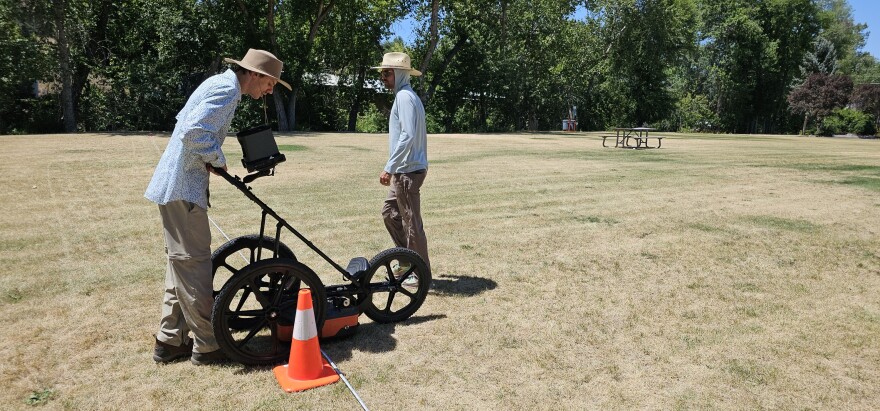
Chelsea Rose
| 
Chelsea Rose
|
Southern Oregon University is one of many schools that offers an opportunity for students to gain experience and insight into the field of archaeology by providing a hands-on summer intensive program. Participants in this year’s Oregon Chinese Diaspora Project Archaeological Field School visited four sites across the state that were selected for their potential to add to our growing database of Chinese American sites and stories. We learned about life in the John Day Chinatown, started digging in to the history of the Chinese cowboys and ranch hands of Grant County, and explored several facets of the historical Chinese immigrant community of Astoria and Oregon’s coastal canneries.
Students learned about archaeological survey (a fancy way to say walking around and looking for things), excavation (i.e., how to dig square holes with straight walls), site sketching and mapping (how to draw things nicely), and more. We were joined by our colleagues at Historical Research Associates Inc. in John Day and Astoria, where the class learned all about Ground Penetrating Radar (or, GPR as we say in the biz). This non-invasive technique allows us to see underground, so we can better understand site formation processes, locate buried features and foundations, and even identify potential hazards (like buried fuel tanks from long-ago gas stations. True story). We also toured a variety of historical sites and museums, which was not only a treat in and of itself, but helped root us in the communities in which we were working.

Experiences like this are a right of passage for archaeologists. You not only learn the relevant skills of the trade needed to enter the field as a professional, but equally important, whether or not a “career in ruins” is really for you. Mixed in with the wonder of discovery and sense of adventure (some of our daily commutes were seriously 4wd truck commercial material), you get heat, rain, pokey and bitey things, and this year, a tsunami advisory was thrown into the mix for good measure. Archaeology is also a team sport—so a month of camping and cooking together will make it real obvious if you are better suited for the solo life of a plumber or computer programmer. But the reward? We get to speak for the people of the past, many of whom have no voice in the documentary record.
If we do not collectively cherish and steward these resources—on public lands and in our backyards—we risk losing the opportunity to understand our shared past.
Our field school also focuses on “public archaeology,” which meant we had free community lectures, trivia nights, and story sharing events mixed in. But you don’t have to join a field school to learn about archaeology. The Portland State University-based Archaeology Roadshow has been bringing public archaeology fun across the state for years, with annual summer events in Portland, Bend, and Burns, and a winter event in The Dalles on December 6, 2025. In August the SOU Laboratory of Anthropology joined the Southern Oregon Historical Society and others for our third annual Archaeology Night at the historic Hanley Farm, where local families came to learn about artifacts and the science of archaeology from a variety of local professionals, organizations, and agencies. While Oregon’s public archaeology game is still strong, some beloved national programs are conspicuously silent these days. For decades the Passport in Time Program, know as the PIT program, has paired citizen scientists with archaeologists on public lands. This allowed non-professionals to play archaeologist for the summer alongside professionals, and contributed important knowledge about our shared history on public lands. While the pause or potential loss of this free program is alarming, even more so is the erosion or devaluation of the important rules and regulations that protect cultural heritage.

Chelsea Rose
| 
Chelsea Rose
|
Archaeology can be interesting and entertaining, but it is also an important tool for capturing information about the past; whether it be understanding ancient environments, human adaptations to a changing climate, under-represented populations that did important things that benefit us today, archaeological sites are non-renewable resources, and if we do not collectively cherish and steward these resources—on public lands and in our backyards—we risk losing the opportunity to understand our shared past. And I would argue that this is at our peril. So keep your trowels sharp and your ears to the ground on how you can help your local archaeologists protect and preserve the important cultural resources in your community, and beyond. The next generations will thank you!



